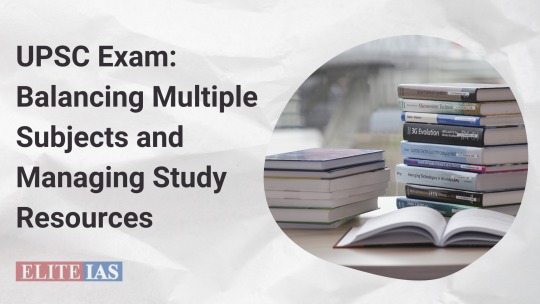#procrastination in upsc preparation
Text
Negative Habits to Avoid for UPSC Preparation
Imagine preparing for the UPSC exam is like setting off on a thrilling adventure. But just like any adventure, there are challenges to overcome. It takes a lot of hard work, sticking to your goals, and having a good plan. But, sometimes, even if you're really trying your best, you might find yourself doing things that could make it harder for you to succeed. In this guide, we'll explore common negative habits faced by UPSC aspirants and provide straightforward solutions to overcome them. By implementing these simple strategies, aspirants can navigate through challenges effectively and achieve success in their UPSC journey.
Procrastination - Putting Off Tasks

Procrastination is when we delay tasks or waste time on unimportant things. Many UPSC aspirants struggle with procrastination, which can lead to missed study sessions and last-minute pressure.
To overcome procrastination, break your study tasks into smaller, manageable parts. To create a sense of urgency, establish particular deadlines for every task. By taking small steps consistently, you can avoid procrastination and stay on track with your study schedule.
“You may delay, but time will not.”
― Benjamin Franklin
There are always distractions, if you allow them! Successful people remain optimistic and concentrated on their goals regardless of their surroundings. They stay focused. They avoid getting distracted, which is common in today's digital world. Social media, notifications, and other distractions can easily divert our attention away from studying.
To avoid distractions, create a dedicated study space that is free from potential distractions. Turn off notifications on your phone and use productivity tools to block distracting websites. Set specific times for studying and avoid multitasking. By minimizing distractions, you can improve focus and productivity during your study sessions.
Distractions - Losing Focus

“Work is hard. Distractions are plentiful. And time is short.”
― Adam Hochschild
Lack of Consistency

Consistency is really important for doing well in UPSC preparation. It’s key to success. However, many aspirants struggle to maintain a consistent study routine.
To overcome this, establish a daily study schedule and stick to it religiously. Make sure you stick to your study schedule and give it more importance than other things. Set realistic goals for each study session and keep checking how well you're doing. By making studying a habit and sticking to a consistent routine, you can maximize your productivity and progress in your UPSC preparation.
“Success isn't always about greatness. It's about consistency.
Consistent hard work leads to success. Greatness will come.”
― Dwayne Johnson
Neglecting Health and Adequate Sleep

UPSC preparation can be mentally and physically demanding, and many aspirants neglect their health in pursuit of their goals. However, neglecting your health can have negative consequences on your ability to study effectively. Sleep is essential for cognitive function, memory retention, and overall well-being. However, many aspirants neglect their sleep in favor of studying late into the night. This can lead to sleep deprivation, which can impair your ability to focus, concentrate, and retain information.
To prioritize your health, make sure to get an adequate amount of sleep each night. Aim for at least 7-8 hours of sleep to ensure that your mind and body are well-rested. In addition, make time for regular exercise and physical activity to reduce stress and improve overall well-being. Finally, don't forget to eat a balanced diet and stay hydrated to fuel your body and brain for studying.
Relying on One Study Method

Every aspirant has their own preferred study method, whether it's reading, taking notes, or practicing past papers. However, relying solely on one study method can limit your learning and comprehension.
To overcome this, try diversifying your study methods to engage different parts of your brain. For example, if you're used to reading, try incorporating more visual aids or discussing concepts with peers. Try out various methods of studying until you discover which one suits you the most. By diversifying your study methods, you can improve your understanding and retention of the material.
Negative self-talk can be dangerous to your confidence and motivation. Many aspirants struggle with self-doubt and fear of failure, which can hold them back from reaching their full potential.
To overcome negative self-talk, practice self-compassion and positive affirmations. Instead of focusing on your shortcomings, celebrate your achievements and strengths. Be around friends and family who support you and have faith in your skills. By cultivating a positive mindset and practicing self-love, you can overcome self-doubt and achieve success in your UPSC journey.
Negative Self-Talk - Self-Doubt

"One important key to success is self-confidence.
An important key to self-confidence is preparation."
― Arthur Ashe
Trying to Read Everything

UPSC aspirants are often overwhelmed by the sheer volume of reading material available. Many aspirants feel pressured to read every book and resource on a given topic, leading to stress and burnout.
To overcome this, focus on quality over quantity when it comes to reading. Prioritize essential books and resources that cover the core concepts and topics of the UPSC syllabus. Take notes as you read to help reinforce your understanding and retention of the material. Remember, it's better to thoroughly understand a few key concepts than to skim/go through numerous resources without grasping the core concepts.
Disorganization can hinder your ability to study effectively and efficiently. Many aspirants struggle to keep track of study materials, deadlines, and important dates.
To overcome this, create a study schedule and organize your study materials in a systematic manner. Use folders, binders, or digital tools to keep your study materials organized and easily accessible. Break down your study schedule into smaller, manageable tasks and set deadlines for each task. By staying organized, you can reduce stress and improve productivity in your UPSC preparation.
Lack of Organization

“For every minute spent organizing, an hour is earned.”
― Benjamin Franklin
Misplaced Study Groups

Study groups can be a valuable resource for UPSC aspirants, providing support, motivation, and shared knowledge. However, not all study groups are created equal, and some aspirants may find themselves in study groups that are not conducive to effective studying.
To overcome this, choose study partners wisely and find individuals who are serious and committed to their UPSC goals. Look for study groups or forums where you can engage with like-minded aspirants who share your dedication and enthusiasm for UPSC preparation. By surrounding yourself with supportive and motivated study partners, you can enhance your learning and stay on track with your UPSC goals.
Overcoming negative habits is essential for UPSC aspirants to succeed in their journey. By implementing simple strategies such as breaking tasks into smaller parts, minimizing distractions, maintaining consistency, prioritizing health, diversifying learning methods, fostering a positive mindset, finding a balance between work and study, focusing on quality reading, staying organized, choosing study partners wisely, using the internet judiciously, and prioritizing sleep, aspirants can navigate through challenges effectively and achieve success in their UPSC preparation. Remember, success in the UPSC examination requires dedication, perseverance, and a willingness to overcome obstacles. Keep pushing forward, stay focused on your goals, and believe in yourself—victory is within reach!
#upsc#education#upsc2024#upscpreparation#upscstudymaterial#quotes for upsc aspirants#quotes for students motivation#Misplaced Study Groups in UPSC Preparation#Lack of Organization in UPSC Preparation#Trying to Read Everything in UPSC Preparation#Negative Self-Talk - Self-Doubt#Relying on One Study Method#Neglecting Health and Adequate Sleep in upsc preparation#Lack of Consistency in upsc preparation#Distractions in upsc preparation#procrastination in upsc preparation#Procrastination#upsc syllabus ignorance#upsc exam strategy mistakes#ENSURE IAS coaching tips#upsc self-study bad habits#upsc time management mistakes#ENSURE IAS academy tips#upsc coaching center habits to avoid#upsc study routine mistakes#UPSC#bad habits for upsc exam#common mistakes in upsc preparation#ENSURE IAS preparation tips#negative habits for upsc aspirants
1 note
·
View note
Text
Crafting an Optimal Study Environment: Tips for UPSC Aspirants at Krishna PG Stays
Embarking on the journey to crack the UPSC (Union Public Service Commission) examination requires dedication, perseverance, and strategic preparation. Among the myriad factors that contribute to success, creating the perfect study environment is paramount. For UPSC aspirants residing at Krishna PG Stays, here are some invaluable tips to optimize your study space and maximize your chances of achieving your goals.
Designate a Dedicated Study Area: Establish a specific corner or room within your Krishna PG Stays accommodation as your study zone. This designated space will serve as your sanctuary for focused learning, free from distractions and conducive to concentration.

Prioritize Comfort and Ergonomics: Invest in comfortable seating and ergonomic furniture to support long study sessions without physical discomfort. Ensure that your chair provides adequate lumbar support and that your desk is at an appropriate height to promote good posture and prevent fatigue.

Harness Natural Light: Whenever possible, position your study area near a window to harness natural light. Natural lighting not only reduces eye strain but also enhances mood and productivity, creating a more inviting and refreshing study environment.
Minimize Distractions: Identify and minimize potential distractions in your study space. Keep your study area clutter-free and free from unnecessary gadgets or items that may tempt you to procrastinate. Consider using noise-canceling headphones to block out external sounds and maintain focus.

Personalize Your Space: Infuse your study environment with personal touches that inspire and motivate you. Decorate your study area with motivational quotes, pictures of inspirational figures, or vision boards outlining your career aspirations. Surrounding yourself with positive imagery cultivates a sense of purpose and determination.
Organize Study Materials Effectively: Implement organizational systems to keep study materials easily accessible and neatly arranged. Use shelves, folders, or storage bins to categorize books, notes, and reference materials, ensuring efficient retrieval when needed. A well-organized study space fosters mental clarity and streamlines the learning process.

Establish a Study Routine: Develop a consistent study routine tailored to your individual preferences and energy levels. Allocate specific times each day for focused study sessions, making optimal use of peak concentration periods. By adhering to a structured study schedule, you cultivate discipline and momentum in your exam preparation.

Stay Connected but Manage Social Interactions: While residing at Krishna PG Stays, it's essential to strike a balance between social interactions and solitary study time. Engage in collaborative study sessions with fellow UPSC aspirants to exchange ideas and insights, but also allocate sufficient uninterrupted periods for independent study and reflection.

Take Breaks and Practice Self-Care: Recognize the importance of regular breaks and self-care activities in maintaining productivity and well-being. Incorporate short breaks into your study routine to rest and recharge, whether it's taking a leisurely walk, practicing mindfulness, or indulging in a hobby. Prioritizing self-care nurtures resilience and sustains long-term motivation in your UPSC journey.

Seek Support and Guidance: Leverage the resources and support networks available to you at Krishna PG Stays and beyond. Engage with mentors, tutors, or online forums to seek guidance, clarify doubts, and stay informed about UPSC exam trends and strategies. Surrounding yourself with a supportive community fosters collaboration, accountability, and collective growth.
In conclusion, optimizing your study environment is instrumental in your UPSC preparation journey at Krishna PG Stays. By implementing these tips and customizing your study space to suit your needs, you empower yourself to study effectively, stay motivated, and ultimately realize your aspirations of success in the UPSC examination. Stay focused, stay determined, and embrace the transformative power of your dedicated study environment.
Visit Krishna PG for comfortable accommodation while preparing for your UPSC exams.
#hostel#student#upsc#accomodation#hospitality#best pg in karol bagh#PG for girls and boys#PG with food#student life
3 notes
·
View notes
Text
Challenges faced by UPSC aspirants
In India having a government job guarantees you the utmost prestige in your family. And it is truly justified as government exams are one of the hardest exams to crack. It needs:
High level of self-discipline
Great resilience power
Years of hard work
Good general awareness
A zeal to contribute towards the nation
Let us see what are the various challenges an UPSC aspirant faces while preparing for the exam.
Getting started: UPSC is no child’s play. There are so many options and so many things to take care of. Where to start, when to start and how to start? So many questions pop in mind at once. Some students spend a lot of time in planning, procrastinating it. While others do not plan enough and thus get confused on later stage.
Before taking a long dive in the ocean called UPSC, students should give a fair enough time to planning on how they going to start preparing. They should make a road map covering important factors like:
How early should they start preparing? The time needed for preparation varies person to person. It depends on everyone’s level of experience and situations. Every aspirant should firstly evaluate their current level of knowledge.
Will they be taking coaching? There are a lot of coaching options available nowadays, both online and offline. One should give it a great thought about which mode would be best for them as both have its own pros and cons.
2.Increasing competition: With significant rise in awareness and access to facilities, number of aspirants have been increasing day by day. Reportedly, the count of students who apply for a UPSC exam has rose from 3 lakhs (approximately) to 11 lakhs (approximately) while the number of vacancies stands at a total of 1105. This increases competition.
3.Loads of Syllabus: UPSC exam tests your knowledge about every subject possible. It tests your knowledge about History, Geography, Economics, Political state of the country, Mathematics and much more. It becomes hectic to complete all on time.
It will require you to adapt a holistic approach and revise everything for at least 2 times.
4. Facing Family and societal pressure: As soon as people get to know that someone is preparing for UPSC exam, it automatically raises their expectations of that person. It does earn you a lot of respect but with that respect also comes a lot of pressure. Pressure of cracking the UPSC exam.
At times like this even motivating words can feel very overwhelming. Students should only focus on their plan and work towards achieving it. They should focus on doing better than yesterday.
One of the biggest challenges that a student faces is non availability of books in the market. An UPSC aspirant already has so many things to take care of so I have found an app that will take care of all your book related needs.
Nogozo ! Nogozo is an online bookstore. It is an all-in-one place where you can BUY, SELL, RENT books.
With NOGOZO, you can:
BUY new as well as used books at lowest prices.
SELL your used old books and get the best prices for it.
RENT books at minimum prices and get the freedom to read at your own pace. Rent your favourite book starting at Rs.10 only.
They have a huge collection which consists of Competitive exams books for JEE, NEET, UPSC exams, NCERT, ICSE BOOKS and much more.
They have a dedicated collection for government exams which also has UPSC book list in hindi medium.
You can visit the website: www.nogozo.in
Download the app today at Playstore and use the code *SHAILJA50* for exclusive offers.
#upscaspirants#ncert#iasexam#nogozo#oldbooks#usedbooks#agra#buybooks#sellbooks#rent#government#govtexam#upsc2023#cbse class 10#cbse books#onlinebookstore#agrabooks
4 notes
·
View notes
Text
Your Ultimate Guide to Cracking the Civil Services Exam
Blog- 1 AG IAS
Top 6 Steps to Becoming an IAS Officer:
Your Ultimate Guide to Cracking the Civil Services Exam
Becoming an Indian Administrative Service (IAS) officer is a dream for many in India. As one of the most prestigious and challenging roles in the country, the journey to becoming an IAS officer involves dedication, strategic planning, and hard work. Here's a step-by-step guide How to become IAS officer.
Step 1: Understand the Role and Requirements
What is an IAS Officer?
An IAS officer plays a crucial role in the administration of both the central and state governments, implementing policies and managing various governmental functions. The responsibilities range from handling administrative duties, law and order, developmental work, and more.
Eligibility Criteria
Before you start your preparation, ensure you meet the basic eligibility criteria:
Nationality: Indian citizen.
Age Limit: 21 to 32 years (general category) with age relaxations for other categories.
Educational Qualification: A bachelor’s degree from a recognized university.
Step 2: Learn About the UPSC Civil Services Examination
The Union Public Service Commission (UPSC) Civil Services Examination (CSE) is the gateway to becoming an IAS officer. The exam is conducted in three stages:
Preliminary Examination (Prelims): Objective-type questions to screen candidates for the Main Examination.
Main Examination (Mains): Descriptive-type questions to test candidates' academic and intellectual capabilities.
Personality Test (Interview): Assessing the candidate's personality, suitability, and decision-making abilities.
Step 3: Develop a Comprehensive Study Plan
Understand the Syllabus and Exam Pattern
Thoroughly review the syllabus and exam pattern for both the Prelims and Mains. Familiarize yourself with the subjects, topics, and weightage of each section. Key areas include:
General Studies
Optional Subject (chosen by the candidate)
Essay Writing
Ethics, Integrity, and Aptitude
Create a Timetable
Design a realistic and balanced timetable that covers all subjects and allows for regular revisions. Allocate time for:
Daily reading of newspapers and current affairs
In-depth study of subjects
Answer writing practice
Regular self-assessment through mock tests
Step 4: Gather the Right Study Materials
Standard Books and Resources
Select the best books and resources for your preparation. Some recommended books include:
NCERT Books: For basic concepts.
Indian Polity by Laxmikanth: For polity and governance.
Indian Economy by Ramesh Singh: For economics.
India's Struggle for Independence by Bipan Chandra: For modern history.
Online Resources
Utilize online platforms, apps, and YouTube channels that offer lectures, notes, and mock tests. Websites like ClearIAS, Mrunal, and Unacademy can be particularly helpful.
Step 5: Practice Regularly and Take Mock Tests
Answer Writing Practice
Effective answer writing is crucial for the Mains examination. Practice writing concise, coherent, and well-structured answers regularly. Join test series and participate in answer writing practice groups.
Mock Tests and Previous Year Papers
Regularly attempt mock tests to gauge your preparation level, identify weaknesses, and improve time management. Analyzing previous year question papers will give you insights into the exam pattern and frequently asked questions.
Step 6: Stay Consistent and Motivated
Stay Focused
Last by not the least step in How to become IAS officer Consistency is key to cracking the UPSC exam. Stick to your study plan, and avoid procrastination. Maintain a balance between study and relaxation to prevent burnout.
Stay Updated and Adaptive
Stay updated with current affairs, government policies, and global events by reading newspapers like The Hindu, Indian Express, and magazines like Yojana and Kurukshetra. Adapt your study plan based on feedback from mock tests and changing patterns in the exam.
Join a Support Group
Joining a study group or online forum can provide you with support, motivation, and valuable insights. Engaging with peers preparing for the same goal can help in maintaining a competitive spirit.
Conclusion
Becoming an IAS officer is a rigorous journey that requires strategic planning, perseverance, and dedication. By following these six steps—on How to become IAS officer understanding the role and requirements, learning about the UPSC exam, developing a study plan, gathering the right materials, practicing regularly, and staying consistent—you can enhance your chances of success. Remember, the path may be challenging, but with determination and hard work, your dream of becoming an IAS officer can become a reality. Good luck!
0 notes
Text
Preparing for the UPSC (Union Public Service Commission) exam is a significant undertaking that demands meticulous planning and access to reliable resources. Handwritten notes play a pivotal role in UPSC preparation, aiding in retention and reinforcing understanding. In this article, we will explore effective strategies for UPSC preparation, highlighting the importance of handwritten notes and recommending "Pulse Handwritten Notes for UPSC" by Arihant Publication as a valuable resource.
Understanding the UPSC Exam:
Overview of the Exam
The UPSC exam, known as the Civil Services Examination (CSE), is conducted in three stages: Preliminary, Mains, and Interview. It is renowned for its vast syllabus and comprehensive evaluation of candidates' knowledge, aptitude, and personality.
Importance of Preparation
Thorough preparation is indispensable for success in the UPSC exam. It requires not only a deep understanding of subjects but also critical thinking, analytical skills, and effective time management.
Creating a Study Plan
Setting Realistic Goals
Begin by setting achievable goals that align with your strengths and weaknesses. Break down the syllabus into manageable sections and establish a timeline for completion.
Daily and Weekly Schedules
Craft a balanced study schedule that incorporates dedicated time for each subject, revision, and practice. Strive for consistency and adaptability in your study routine.
Choosing the Right Study Materials
Standard Textbooks
Select standard textbooks recommended by experts and previous UPSC toppers. NCERT books serve as an excellent foundation for building conceptual clarity.
Online Resources
Supplement your studies with reputable online resources such as official UPSC websites, educational platforms, and digital libraries. Ensure the credibility and relevance of the content.
The Role of Handwritten Notes in UPSC Preparation
Benefits of Handwritten Notes
Handwritten notes offer several advantages, including improved retention, personalized summaries, and active engagement with the material. They serve as a tangible representation of your learning journey.
How to Make Effective Handwritten Notes
Focus on capturing key concepts, keywords, and diagrams in your handwritten notes. Keep them concise, organized, and visually appealing to facilitate quick revision and retrieval of information.
Recommended Resource: Pulse Handwritten Notes for UPSC by Arihant Publication
Overview of the Book
"Pulse Handwritten Notes for UPSC" by Arihant Publication is a comprehensive compilation of meticulously crafted notes designed to streamline UPSC preparation. It covers the entire syllabus in a structured and concise format.
Why Choose This Book
This book stands out for its clarity, accuracy, and relevance to the UPSC exam. The notes are meticulously curated to encompass essential topics and subtopics, making them ideal for quick revision and in-depth study.
Subject-wise Preparation Strategies
General Studies
Develop a holistic approach to General Studies by integrating current affairs, historical perspectives, and analytical frameworks. Practice answer writing to enhance articulation and comprehension.
Optional Subjects
Choose optional subjects based on your interest, background, and scoring potential. Dive deep into the chosen subject matter and supplement your studies with diverse perspectives.
Current Affairs
Stay abreast of current affairs through daily newspaper reading, online portals, and curated magazines. Integrate current affairs updates into your notes for comprehensive coverage.
Time Management Techniques
Prioritizing Tasks
Prioritize tasks based on urgency, importance, and difficulty level. Allocate time efficiently to cover core subjects, revision, and practice tests.
Avoiding Procrastination
Combat procrastination by setting deadlines, breaking tasks into smaller milestones, and maintaining accountability. Cultivate a disciplined study routine to stay on track.
Revision and Practice
Importance of Revision
Regular revision is essential for consolidating knowledge and reinforcing concepts. Schedule dedicated time for revision and employ active recall techniques.
Mock Tests and Previous Year Papers
Engage in regular mock tests and solve previous year papers to simulate exam conditions and gauge your preparedness. Analyze your performance to identify strengths and areas needing improvement.
Staying Motivated and Healthy
Mental Health Tips
Prioritize self-care by practicing mindfulness, seeking social support, and maintaining a healthy work-life balance. Address stressors proactively and seek professional help if needed.
Physical Health Tips
Nourish your body with nutritious meals, regular exercise, and sufficient rest. Incorporate stress-relief activities such as yoga, meditation, and outdoor recreation into your routine.
Conclusion
Success in the UPSC exam demands dedication, resilience, and strategic preparation. Handwritten notes serve as invaluable companions on this journey, aiding in retention, revision, and comprehension. Consider integrating "Pulse Handwritten Notes for UPSC" by Arihant Publication into your study regimen to enhance your preparation and maximize your chances of success.
0 notes
Text
6 bad habits to avoid while preparing for UPSC
Discover the game-changing approach for passing UPSC examinations, and say goodbye to those stressful last-minute cramming sessions!

Preparing for the Union Public Service Commission (UPSC) test is difficult. It demands dedication, effort, and a well-planned study schedule. However, even the best-intentioned hopefuls might slip into bad habits that jeopardize their prospects of success. This curated post will look at six bad behaviors you should avoid during your UPSC preparation journey.
Bad Habit 1 Procrastination
Procrastination, the greatest foe of productivity, reveals itself in the postponing of duties and the indulgence in little diversions. This behavior is especially dangerous for UPSC applicants since it breaks productive study sessions, creating a sense of last-minute urgency. Because the UPSC test is so important, procrastination might seriously impair one's ability to cover the material in its entirety and do well. To ensure full preparation and success in pursuing their goals, aspirants must meet and beat this opponent straight on, establishing strict study habits and fostering resilience in the face of temptation. and choose the best coaching in your area. I recommend that join Chetan Bharat Learning in Chandigarh Punjab They offer the best UPSC coaching in Chandigarh
It entails deferring chores or activities and squandering time on unnecessary distractions. Procrastination might be damaging to UPSC applicants since it disrupts good study sessions and causes last-minute stress. To break this undesirable habit:
Divide your study tasks into tiny, achievable chunks. This will make them less intimidating and simpler to begin with.
Set deadlines for each work to instill a feeling of urgency and accountability.
Bad Habit 2: Distractions
Distractions are a huge difficulty for UPSC hopefuls since they take their focus away from critical study materials and prevent effective study sessions. Distractions, ranging from the constant buzz of social media updates to the appeal of non-essential work, can interrupt attention and prevent efficient preparation. Recognizing the influence distractions may have on their goals, aspirants must actively control their study settings, eliminate possible distractions, and develop the discipline required to sustain attention in the face of external stimuli. UPSC hopefuls may maximize their study efforts and stay on track to succeed in the competitive test by prioritizing their study objectives and implementing distraction-reduction tactics.
To minimize distractions and stay focused:
Create a dedicated study area devoid of potential distractions. This might be a calm spot in your home or a library.
Use productivity tools and applications to block distracting websites or set timers for concentrated study times.
Bad Habit 3: Lack of consistency
Lack of consistency is a severe obstacle for UPSC applicants, undermining the steady progress required to learn the large subject. The inconsistent nature of study sessions impedes the memory and comprehension of key topics, limiting applicants' capacity to thrive in the competitive examination. Recognizing the critical necessity of consistency, aspirants must emphasize regular and rigorous study regimens, allotting a certain time each day for full topic review. By developing a habit of consistency, candidates may maximize their study efforts, improve retention, and considerably increase their chances of succeeding in the difficult UPSC test.
To ensure consistency:
Create a daily study program and stick to it. Consider your study time non-negotiable.
Set reasonable goals and track your progress regularly. This will help you maintain motivation and accountability
Bad Habit 4: Neglecting physical and mental health
Neglecting your physical and mental health while studying for the UPSC examinations might be a bad habit. While achieving success in these difficult tests necessitates intense focus and hard effort, it is critical not to neglect one's well-being in the process. Ignoring physical activity, a good diet and mental relaxation can result in burnout, lower productivity, and even health concerns. Prioritizing self-care routines such as regular exercise, good eating habits, and mindfulness practices is critical for maintaining optimal physical and mental health, which will eventually improve productivity and performance throughout UPSC preparation. Here are a few tips
Prioritize sleep and exercise. Get enough rest and indulge in physical activity to refresh your mind and body.
Relaxation practices such as meditation or yoga might help you reduce tension and anxiety.
Bad Habit 5: Using only one study approach
When studying for UPSC examinations, relying entirely on one study strategy might be restricting. While it may appear easier to stick to a tried-and-true method, it might impede a thorough grasp and memory of the extensive curriculum. Everyone has a different learning style, and adopting a range of study methods, such as reading, taking notes, talking with peers, practicing past papers, and using visual aids, can dramatically improve understanding and memory retention. Using a variety of study approaches gives a more comprehensive understanding of the topic, boosting the likelihood of success in the UPSC examinations.M
To vary your research methods:
Read from many sources and mediums. This will help you get a broader perspective and reinforce your knowledge.
Participate in group discussions and simulated examinations. Interacting with other applicants and simulating exam-like scenarios will help you develop your analytical abilities.
Habit 6: Negative self-talk and self-doubt
Negative self-talk and self-doubt can significantly impair UPSC preparation efforts. Your thinking is an important part of succeeding in such tough tests, and allowing negative ideas to dominate can damage confidence and enthusiasm. Constant self-criticism or uncertainty in one's ability impedes effective learning and problem-solving. It is critical to identify and fight negative self-talk, replacing it with positive affirmations and a development mentality. Developing self-confidence and resilience is essential for overcoming obstacles and attaining success in UPSC examinations. Thus, cultivating a positive and inspiring inner dialogue is critical for retaining motivation and momentum throughout the preparation process.
To counteract this:
Create positive affirmations and express appreciation. Remind yourself of your strengths and express gratitude for the opportunity to pursue UPSC.
Surround yourself with people who believe in your ability and encourage you throughout difficult times.
Conclusion
In your quest to pass the UPSC test, and the best UPSC Institute in Chandigarh is Chetan Bharat Learning it is critical to identify and find all Questions and answers our expert teacher improves your learning skills and You will be more successful if and follow you all the thing about health, vary study techniques, and cultivate a positive mentality. Remember that clearing the UPSC is more than simply studying hard; it's about building the correct habits and mentality to drive you forward
#coaching#online upsc#chandigarh#punjab civil services#punjab pcs#pcs coaching#chetan bharat learning#PCS coaching
0 notes
Text
Unlocking the Path to UPSC Success: Tips for College Students
Introduction:
Cracking the UPSC (Union Public Service Commission) examination while pursuing college education requires strategic planning, disciplined study habits, and efficient time management. With the support of the best IAS coaching in Kolkata, diligent adherence to the UPSC syllabus, and staying updated with current affairs from magazines, college students can effectively prepare for this prestigious examination. In this blog, we’ll delve into practical strategies and techniques for college students to crack the UPSC exam, while incorporating keywords like best IAS coaching in Kolkata, IAS coaching in Kolkata, UPSC coaching in Kolkata, current affairs magazine, and UPSC syllabus.
1. Create a Realistic Study Schedule:
- Develop a well-structured study schedule that balances college classes, assignments, and UPSC preparation.
- Allocate specific time slots each day for UPSC studies, focusing on high-priority topics outlined in the UPSC syllabus.
2. Utilize College Resources:
- Leverage college resources such as libraries, study groups, and academic advisors to supplement your UPSC preparation.
- Incorporate UPSC-related topics into college assignments or projects whenever possible to deepen your understanding.
3. Optimize Study Techniques:
- Adopt effective study techniques such as active learning, mind mapping, and mnemonic devices to enhance retention and understanding of UPSC concepts.
- Use commuting time or breaks between college classes to review UPSC study materials or listen to audio lectures.
4. Enroll in UPSC Coaching Institutes:
- Consider enrolling in reputable UPSC coaching institutes in Kolkata to receive expert guidance, study materials, and mock tests.
- UPSC coaching institutes offer structured study plans, personalized mentorship, and current affairs updates to help college students streamline their preparation.
5. Stay Updated with Current Affairs:
- Regularly read newspapers, magazines, and online portals to stay informed about current affairs, government policies, and socio-economic developments.
- Allocate dedicated time each day to review current affairs topics relevant to the UPSC examination.
6. Practice Time Management:
- Develop strong time management skills to balance college commitments, UPSC preparation, and personal activities effectively.
- Prioritize tasks based on urgency and importance, and avoid procrastination to maximize productivity.
7. Maintain a Positive Mindset:
- Stay motivated and focused on your goal of cracking the UPSC exam, despite the challenges and setbacks you may encounter.
- Surround yourself with supportive peers, mentors, and family members who encourage your aspirations and provide guidance when needed.
Conclusion:
Cracking the UPSC exam while in college requires dedication, perseverance, and strategic planning. By creating a realistic study schedule, utilizing college resources, optimizing study techniques, enrolling in UPSC coaching institutes, staying updated with current affairs, practicing time management, and maintaining a positive mindset, college students can effectively prepare for the UPSC examination. With determination and consistent effort, college students can achieve their dream of serving the nation as civil servants and making a positive impact on society.
#upsc coaching in kolkata#upscnotes#upsc.gov.in#upsccoaching#upsc2024#upsc#upscprelims#upscaspirants#civil services examination#iasofficer#ias preparation#ias
0 notes
Text
10 Most Common Mistakes to avoid in UPSC Prelims Preparation

Embarking on the journey to crack the UPSC Prelims can be like placing sail on a widespread ocean of information, wherein the winds of guidance can either propel you ahead or leave you adrift. As you navigate through the waves of syllabi and take a look at materials, it's crucial to be clear of commonplace pitfalls that can sabotage your efforts and jeopardize your achievement. Here, we unveil the 10 most common errors to avoid in UPSC Prelims practice, upsc coaching in vadodara guiding you towards smoother cruising and brighter horizons.
Underestimating the Syllabus: One of the gravest mistakes UPSC aspirants make is underestimating the breadth and intensity of the syllabus. The UPSC Prelims syllabus is expansive, covering a diverse range of topics from history and geography to present day affairs and preferred science. It's critical to acquaint yourself with the syllabus and leave no stone unturned to your coaching.
Ignoring NCERTs and Basic Books: Neglecting the NCERT textbooks and essential reference books is similar to building a house without a stable basis. These books offer the groundwork to your understanding of various topics and serve as critical sources for constructing conceptual readability. Ignoring them can leave gaps in your information that can show unfavorably in the examination.
Overlooking Previous Year Papers: Past is prologue, specifically in the realm of UPSC guidance. As per ias academy in vadodara, Previous 12 months question papers provide beneficial insights into the exam pattern, query types, and weightage of different topics. By overlooking them, you pass over a golden opportunity to make yourself familiar with the exam's nuances and tailor your practice as a consequence.
Relying Solely on Coaching Materials: While education institutes can offer guidance and structure to your coaching, depending entirely on their examine materials may be a recipe for catastrophe. It's crucial to complement training materials with self-look at, various assets, and personal studies to increase a well-rounded understanding of the subjects.
Ignoring Current Affairs: In the ever-changing landscape of UPSC assessments, staying abreast of contemporary affairs is non-negotiable. Ignoring cutting-edge affairs can leave you woefully unprepared for questions about recent activities, authorities schemes, and global tendencies. Cultivate the habit of day by day news reading, make use of reliable assets, and hold updated notes to ace this vital exam.
Overlooking Mock Tests and Practice Papers: Practice makes ideal, specifically inside the realm of UPSC training. Overlooking mock assessments and exercise papers deprives you of the opportunity to simulate examination situations, assess your strengths and weaknesses, and refine your time management competencies. Incorporate everyday mock exams into your have a look at schedule to gauge your development and first-class-track your approach.
Neglecting Revision and Consolidation: The journey to UPSC success isn't always a dash but a marathon, requiring constant attempt and strategic planning. Neglecting revision and consolidation can result in the erosion of hard-earned know-how and weaken your draw close on essential concepts. UPSC coaching in baroda allocate committed time for revision, create concise notes, and rent mnemonic gadgets to aid retention and remember.
Getting Distracted by Peripheral Resources: In the digital age, the internet abounds with a plethora of take a look at materials, video lectures, and online forums vying for your attention. While supplementary resources can be valuable, getting distracted through peripheral assets can divert your recognition and dilute your preparation efforts. Exercise discernment in choosing assets, prioritize satisfactory over amount, and stay centered to your observer plan.
Procrastinating and Lack of Discipline: Procrastination is the bane of UPSC aspirants, luring them into the abyss of distraction and postponement. Lack of subject can derail even the maximum meticulously crafted look at plans and impede progress towards your dreams. Cultivate the subject, adhere to a structured observing schedule, and set manageable objectives to live on the right track and maximize your productivity.
Underestimating the Power of Mindset: Last but now not least, underestimating the strength of mind-set can be a fatal mistake in upsc coaching in surat. The journey is as good a check of mental resilience as its miles of instructional prowess. Cultivate a tremendous mindset, embody setbacks as studying possibilities, and nurture self-notion to your potential to overcome demanding situations and emerge triumphant.
In the end, navigating the UPSC Prelims calls for a mixture of diligence, area, and strategic acumen. By warding off these common errors and charting a course guided by means of understanding and foresight, you could navigate the turbulent waters of UPSC preparation with self assurance and grace. Bon voyage in your journey to UPSC achievement!
For more information and related content on competitive exams, visit competitionpedia.in . Explore a wealth of resources, tips, and insights to enhance your preparation and maximize your chances of success in various competitive exams.
#gpscclassesinsurat#bestgpscclassesinsurat#gpscclassesinsuratwithfees#suratgpscclasses#gpscclassesinsuratadajan#gpscclasssurat
0 notes
Text
How to Prepare Daily Current Affairs for UPSC | Raj Malhotra's IAS Academy
Are you aspiring to crack the UPSC examination and secure a position in the civil services? If so, staying updated with daily current affairs is of utmost importance. Daily current affairs play a significant role in the UPSC examination, as it tests your awareness and understanding of national and international events. In this article, we will explore effective strategies and techniques to help you prepare daily current affairs for UPSC, with insights from the renowned Raj Malhotra's IAS Academy.
Why Is Daily Current Affairs Important?
Before diving into the preparation techniques, let's understand the significance of daily current affairs for UPSC. By staying updated with current affairs, you develop a holistic understanding of various issues and topics that are important for the examination. It helps you in forming informed opinions, enhancing your analytical skills, and improving your answer writing abilities.
Tips to Prepare Daily Current Affairs
1. Start with a Reliable News Source
To ensure accurate and relevant information, it is crucial to choose a reliable news source. Raj Malhotra's IAS Academy suggests referring to reputable newspapers like The Hindu, The Indian Express, and Livemint for comprehensive coverage of current affairs. Additionally, you can explore reliable online platforms, such as government websites, PIB (Press Information Bureau), and Rajya Sabha TV, for authentic information.
2. Create a Structured Schedule
Establishing a structured schedule for your daily current affairs preparation is essential. Allocate a specific time slot each day dedicated solely to current affairs. This consistency will help you build a habit and prevent procrastination. Raj Malhotra's IAS Academy emphasizes the importance of discipline and regularity to stay updated with current affairs effectively.
3. Make Effective Notes
While going through news articles or watching relevant videos, it is crucial to make concise and effective notes. Raj Malhotra's IAS Academy suggests organizing your notes in a systematic manner, focusing on key points, and including relevant facts and figures. This note-making exercise will serve as a valuable resource during revision, saving time and effort in the long run.
4. Analyze Multiple Perspectives
Gaining a comprehensive understanding of current affairs involves analyzing different perspectives on each topic. Raj Malhotra's IAS Academy advises aspirants to go beyond surface-level information and explore diverse viewpoints. This approach helps in developing a well-rounded opinion and enhances your critical thinking abilities.
5. Utilize Mind Maps and Diagrams
Visual tools like mind maps and diagrams can significantly aid in understanding complex topics and interconnections between various subjects. Raj Malhotra's IAS Academy recommends using these tools to summarize and simplify information. Mind maps also help in retaining information better during revision.
6. Regularly Test Your Understanding
Merely reading and noting down information is not enough; it is equally important to assess your knowledge and understanding. Raj Malhotra's IAS Academy suggests taking frequent quizzes, attempting mock tests, and solving previous years' question papers to evaluate your grasp of current affairs. This practice will help you identify your strengths and weaknesses, allowing you to focus on areas that require improvement.
7. Stay Updated with Government Initiatives and Policies
The UPSC examination often includes questions related to government schemes, initiatives, and policies. Raj Malhotra's IAS Academy advises aspirants to closely follow key government announcements and initiatives. Reading government reports and official press releases will provide you with in-depth knowledge and understanding, enabling you to answer questions accurately.
8. Group Discussions and Debates
Engaging in group discussions and debates on current affairs subjects can significantly enhance your learning experience. Raj Malhotra's IAS Academy recommends forming study groups or participating in online forums to discuss various issues. These discussions expose you to different perspectives and help in refining your own viewpoint.
9. Revision is the Key
Lastly, the importance of revision cannot be stressed enough. Regularly revise your notes, mind maps, and important facts to reinforce your understanding. Raj Malhotra's IAS Academy suggests setting aside dedicated time for revision and using different revision techniques like flashcards, self-quizzing, and summarizing key points.
Conclusion
To excel in the UPSC examination, it is crucial to prepare daily current affairs effectively. By following the tips and techniques provided by Raj Malhotra's IAS Academy, you can stay updated with the latest happenings, develop a comprehensive understanding of various subjects, and enhance your overall performance in the UPSC examination. Remember, consistent efforts and dedication are the keys to success in this journey.
0 notes
Text
Online vs. Traditional UPSC Coaching: Which One Fits Your Learning Style

When it comes to preparing for the UPSC exam, there are two main options available to students: online coaching and traditional classroom-based coaching. Both have their own advantages and disadvantages, so it is important to consider which one fits your learning style best before making a decision.
UPSC Online Coaching offers many benefits that traditional classroom-based coaching cannot match. It provides flexibility in terms of when you can study as well as where you can study since all that’s needed is an internet connection and a device such as a laptop or a tablet computer. Additionally, with online courses often being cheaper than those offered by physical institutes due to lower overhead costs incurred by the providers, they offer great value for money too! Lastly, most online courses also provide access to recorded video lectures which allow students more time for revision at their own pace without any pressure from instructors or peers present in classrooms during real-time classes.
On the other hand, Traditional Classroom based Coaching has its merits too! Firstly, face -to -face interaction between teachers and students helps build a better understanding of concepts being taught while providing instant feedback on doubts raised. This allows teachers/instructors greater control over course content delivery compared with prerecorded videos used in Online Courses.
Also Read: Top UPSC Coaching in Bhopal
Secondly, students benefit greatly from peer group discussion sessions held during class hours which help them gain insights into different perspectives on topics discussed apart from honing the analytical skills required during the preparation process itself. Finally, attending regular classes ensures discipline among aspiring candidates who otherwise may be tempted towards procrastination if left unsupervised while studying through Online Courses alone!
In conclusion, then, both types of UPSC Exam Preparation methods have their pros & cons but ultimately what matters most is how well each suits individual student’s learning style preferences – some may prefer self-paced independent studies enabled via UPSC Online Course offerings whereas others might find motivation & guidance provided by Traditional Classroom Based instruction more helpful depending upon individual needs & circumstances!
0 notes
Text
The Crucial Role of Scheduling in Successful Preparation for Competitive Exams in India
Competitive exams in India play a vital role in shaping an individual's academic and professional future. Whether it's the UPSC Civil Services Exam, IIT-JEE, NEET, or any other prestigious exam, thorough preparation is essential for success. Among the many factors that contribute to effective preparation, scheduling holds a paramount position. This blog explores the importance of scheduling and highlights how it can significantly enhance one's chances of achieving desired results in competitive exams.
1. Structure and Organization
Creating a well-defined schedule provides structure and organization to the entire exam preparation process. It helps in breaking down the vast syllabus into manageable study units, ensuring that all topics are covered in a systematic manner. By allocating specific time slots for each subject or topic, individuals can prevent the overwhelming feeling of not knowing where to begin. A clear schedule acts as a roadmap, guiding candidates through their study journey and keeping them focused on their goals.
2. Goal Setting and Tracking Progress
A schedule helps you set realistic goals and track your progress effectively. By breaking down the syllabus into smaller milestones, you can focus on completing specific topics within specified timeframes. Regular assessments and mock tests can be integrated into the schedule to evaluate your understanding and identify areas that require further attention. Tracking your progress not only boosts confidence but also helps in identifying strengths and weaknesses.
3. Maintaining Work-Life Balance
Competitive exam preparation can be mentally and physically exhausting. Without a schedule, it becomes challenging to strike a balance between study hours and personal commitments. A well-planned schedule enables you to allocate time for relaxation, hobbies, exercise, and socializing. This balance is crucial for maintaining motivation, preventing burnout, and keeping your overall well-being intact.
4. Effective Time Management
Competitive exams demand a comprehensive understanding of concepts, extensive practice, and revision. Without proper time management, it's easy to get overwhelmed and fall behind schedule. By creating a schedule, candidates can allocate dedicated time for each subject, topic, and practice sessions. This enables efficient time management, ensuring that no essential areas are neglected. Moreover, a well-planned schedule helps individuals utilize their time optimally, preventing procrastination and distractions.
5. Enhancing Focus and Discipline
Preparing for competitive exams requires unwavering focus and discipline. A schedule acts as a guiding framework, helping you stay on track and avoid distractions. By adhering to a fixed routine, you develop a habit of consistency and discipline, which are essential for long-term success. The scheduled study sessions create a dedicated environment, minimizing interruptions and maximizing concentration.
6. Consistency and Discipline
Consistency and discipline are crucial attributes for success in any competitive exam. By adhering to a schedule, candidates develop a disciplined routine, which fosters a focused mindset. Regular study sessions, revision, and practice become a habit, eliminating the need for last-minute cramming. A consistent study routine also helps in retaining information effectively and building a solid foundation of knowledge.
7. Overcoming Procrastination
Procrastination is a common hurdle faced by many aspirants. With a demanding syllabus and immense pressure, it's easy to succumb to distractions or delay study sessions. However, a well-structured schedule serves as a powerful tool to overcome procrastination. By setting specific study times and goals, individuals are more likely to stay motivated and accountable. The sense of achievement from completing scheduled tasks acts as a positive reinforcement, further motivating candidates to stay on track.
8. Flexibility and Adaptability
While sticking to a schedule is essential, it's equally important to embrace flexibility and adaptability. Circumstances may arise that require adjustments in study plans. A well-designed schedule allows for necessary modifications without derailing the entire preparation process. By incorporating buffer periods or contingency plans, candidates can manage unexpected situations effectively while ensuring progress towards their goals.
9. Stress Management
Competitive exams often induce high levels of stress and anxiety. However, a well-structured schedule can help manage stress levels effectively. Breaking down the syllabus into manageable study units and following a planned routine reduces the feeling of being overwhelmed. It enables individuals to prioritize and allocate time for relaxation, exercise, and rejuvenation, which are essential for maintaining mental and physical well-being during the preparation phase.
10. Mock Test and Revision Strategy
Mock tests are indispensable tools for exam preparation. An organized schedule includes regular mock tests, enabling candidates to simulate exam-like conditions and identify their areas of improvement. Subsequently, time can be allocated for targeted revisions to address weak areas.
11. Buffer for Unforeseen Events
Life is unpredictable, and unforeseen events may disrupt an aspirant's study routine. By incorporating buffer periods into the schedule, candidates can accommodate any delays or emergencies without feeling overwhelmed or falling behind.
12. Confidence and Positive Mindset
A well-structured schedule with tangible milestones and achievements builds confidence in aspirants. The progress made during preparation becomes evident, instilling a positive mindset that significantly impacts the approach towards the exam.
In the highly competitive landscape of Indian exams, effective preparation is vital. By emphasizing the importance of scheduling, this blog has shed light on how a well-structured study plan can significantly enhance one's chances of success. From providing structure and organization to enabling effective time management, discipline, and stress management, scheduling plays a pivotal role. It helps candidates stay focused, motivated, and accountable throughout their preparation journey. Remember, creating a schedule is not enough; one must adhere to it and make necessary adjustments when needed. So, embrace the power of scheduling, and embark on your exam preparation journey with confidence and determination. Success awaits those who plan strategically and execute diligently!
1 note
·
View note
Text
UPSC Exam: Balancing Multiple Subjects and Managing Study Resources

Preparing for the UPSC exam can be an overwhelming task, considering the vast syllabus and the need to balance multiple subjects effectively. Aspiring civil servants often struggle with managing their study resources and optimizing their learning strategies. In this article, we will explore practical tips and techniques to help UPSC aspirants balance multiple subjects and make the most of their study resources.
Understanding the Syllabus and Exam Pattern
Before diving into the preparation process, it is crucial to thoroughly understand the UPSC exam syllabus and exam pattern. Analyze the different subjects and their weightage in the exam. This understanding will allow you to prioritize your studies and allocate appropriate time to each subject based on its importance.
Creating a Study Plan
A well-structured study plan is essential for efficient preparation. Divide your study time into dedicated slots for each subject. Consider your strengths and weaknesses while allocating time. Break down the syllabus into smaller topics and assign specific days or weeks to cover them. Make sure to incorporate regular revisions into your study plan to reinforce your learning.
Managing Study Resources
UPSC aspirants often have access to a wide range of study materials, including books, online resources, and coaching materials. However, it is important to manage these resources effectively to avoid overwhelm. Create a curated collection of study materials based on reliable sources and expert recommendations. Prioritize quality over quantity and select resources that align with the exam syllabus.
Try to get the basic study materials from the best institute for UPSC in Delhi, so you can get started easily without sinking into the sea of study materials.
Adopting Effective Learning Techniques
To make the most of your study time, it is crucial to adopt effective learning techniques. Active learning methods such as making concise notes, mind mapping, and self-quizzing can enhance your understanding and retention of the subjects. Engage in discussions and group study sessions to gain different perspectives and insights from fellow aspirants.
Balancing Multiple Subjects
Balancing multiple subjects can be challenging, but with proper planning and time management, it is achievable. Avoid spending excessive time on a single subject at the expense of others. Allocate study slots for different subjects and rotate between them to maintain a balanced approach. Identify topics that have overlapping concepts and study them together to enhance your comprehension.
Maintaining Consistency and Discipline
Consistency and discipline are crucial for success in the UPSC exam. Set realistic goals and commit to a regular study routine. Avoid procrastination and stick to your study plan. Celebrate small milestones to stay motivated throughout your preparation journey. Remember, it is the consistent effort over time that yields fruitful results.
Conclusion
In conclusion, preparing for the UPSC exam requires effective management of study resources and the ability to balance multiple subjects. By understanding the syllabus, creating a study plan, managing resources, adopting effective learning techniques, and maintaining consistency, you can optimize your preparation and increase your chances of success. Stay focused, persevere, and believe in your abilities. Good luck with your UPSC journey! For your basic doubts, you can also check if any online coaching for IAS is available for you.
Remember, success in the UPSC exam is not solely determined by the number of hours you study but by the quality of your preparation. Implement the strategies outlined in this article and adapt them to your individual learning style. With dedication, perseverance, and the right approach, you can conquer the challenges of balancing multiple subjects and excel in the UPSC exam.
“The future belongs to those who believe in the beauty of their dreams." - Eleanor Roosevelt
#eliteiasacademy#upsc2023#civil services#civil services examination#upscaspirants#upsc#iascoaching#ias#eliteiasindia#delhi
0 notes
Text
Tips on Mastering Time Management for UPSC
If you're an aspiring civil servant in India, then UPSC is definitely on your mind. The Union Public Service Commission (UPSC) exam is one of the toughest exams to crack, and it requires a lot of hard work and dedication. However, apart from knowledge and preparation, time management plays a vital role in clearing this exam successfully. Being able to manage your time effectively can make or break your chances of achieving success in UPSC. In this blog post, we will discuss some tips that can help you master time management for UPSC! And if you're looking for coaching for UPSC in Kolkata, stay tuned because we've got some great insights for you as well!
What is UPSC?
The Union Public Service Commission (UPSC) is the central body responsible for conducting various examinations and recruiting candidates for different services under the Government of India. It was established on 1 October 1926, and since then, it has been playing a vital role in recruiting individuals to serve as civil servants.
One of the most popular exams conducted by UPSC is the Civil Services Examination(CSE), which includes three stages - Preliminary, Mains, and Interview. The CSE exam aims at selecting eligible candidates for prestigious posts like IAS (Indian Administrative Service), IPS (Indian Police Service), IRS (Indian Revenue Service), etc.
Apart from CSE, UPSC also conducts other exams such as Combined Defense Services Exam(CDS) National Defense Academy & Naval Academy Exam( NDA & NA), and Indian Forest Services Examination(IFoS).
UPSC ensures that all its recruitments are based on meritocracy and are free from any political or governmental influences. With its fair practices and rigorous selection processes, UPSC remains one of India's most respected institutions today.
The Importance of Time Management
Time management is a crucial aspect of success in any field, and UPSC preparation is no exception. The vast syllabus of the UPSC exam can be overwhelming, but with proper time management skills, candidates can tackle it efficiently.
Effective time management allows aspirants to allocate their resources optimally towards different aspects of the exam such as studying, practicing mock tests, and revising. It helps them avoid procrastination and distractions that may arise during their preparation period.
Moreover, managing time effectively also enables aspirants to strike a balance between their personal life and studies. Juggling various responsibilities can be challenging; therefore prioritizing tasks based on urgency and importance becomes essential for effective time utilization.
With good time management practices in place, aspirants are likely to have better stress levels as they feel more in control of the situation. They will not find themselves cramming at the last minute or feeling overwhelmed by deadlines.
Mastering time management skills is crucial for success in UPSC exams. Aspirants who plan well ahead tend to perform better than those who don't consider this aspect seriously.
Tips on Mastering Time Management
Effective time management is crucial for success, especially when it comes to preparing for the UPSC exams. To master time management skills, one needs to be disciplined and organized. Here are some tips on how you can manage your time effectively while preparing for the UPSC exams.
Firstly, make a study schedule that suits your learning style and stick to it consistently. This will help you create a routine and stay focused on your goals.
Secondly, prioritize your tasks based on their importance and urgency. Identify what needs immediate attention and what can wait until later in the day or week.
Thirdly, take regular breaks between study sessions. This will help reduce fatigue and improve concentration levels during study hours.
Fourthly, avoid multitasking as much as possible; instead, focus on one task at a time to ensure maximum productivity.
Learn to say no to distractions such as social media or unnecessary phone calls during designated study periods.
Following these simple yet effective tips regularly with discipline and dedication towards studies will surely bring progress in mastering Time Management Skills required for cracking UPSC exam coaching in Kolkata.
Conclusion
Mastering time management is crucial for success in the UPSC exams. It can help you stay organized and focused while preparing for the exam, increasing your chances of success.
To recapitulate, start by setting clear goals and creating a schedule that works best for you. Use technology to your advantage by using apps and tools that help with time management. Avoid distractions such as social media or irrelevant tasks during study hours.
Additionally, consider joining a coaching center like those available in Kolkata which can provide expert guidance on how to prepare yourself better for the exam while keeping track of your progress. Remember that time management is not just about working hard but also smartly utilizing every minute at your disposal.
By following these tips and being disciplined, consistent, and persevering in your efforts toward time management, you will be well on your way to clearing UPSC with flying colors!
0 notes
Text

Top Common Mistakes to Avoid in UPSC Preparation
If you're preparing for UPSC, it's important to avoid common mistakes that can hinder your progress. Shaan Academy, a well-known brand in the field of UPSC coaching, highlights some of the top mistakes to avoid during your preparation. By staying focused, avoiding procrastination, and following a structured study plan, you can improve your chances of success in the UPSC exam. Shaan Academy's expert guidance and resources can help you avoid these mistakes and achieve your goals.
0 notes
Text
How can I prepare for the UPSC CDS?
Preparing for the UPSC CDS (Combined Defence Services) exam requires dedication and hard work. Here are some steps you can take to prepare for the exam:
Understand the exam pattern and syllabus: Familiarize yourself with the exam pattern and the syllabus for the written test and the SSB (Service Selection Board) interview. This will help you to focus on your studies and to know what areas you need to study.
Study the relevant subjects: The CDS exam tests your knowledge in English, general knowledge, and elementary mathematics. Make sure you are well-versed in these subjects by studying them in depth and by taking practice tests.
Stay current with current affairs: A good knowledge of current affairs is essential to do well in the General Knowledge section of the CDS exam. Read newspapers, watch news channels, and subscribe to news magazines to stay updated on current events.
Practice with past papers: Practice with past papers will help you to get an idea of the types of questions that come in the exam, and also to get familiarized with the exam pattern
Physical fitness: CDS is a military academy and it's a physically demanding course. Make sure you are physically fit by exercising regularly and following a healthy diet.
Time Management: Make a study schedule, set goals, and stick to them. Make sure you are managing your time effectively, and avoid procrastination.
Coaching: Joining a good coaching institute for CDS can help you to clear your doubts, give you guidance, and also help you to stay on track with your preparation.
Self-discipline and perseverance are key. Stay motivated and keep on practicing.
Remember that success in the CDS exam requires discipline, hard work, and commitment. Be consistent and stay motivated, and you will be well on your way to achieving your goal.
Cadets defence academy provides the best CDS Coaching centre in Dehradun. The best faculty provides in this academy. Cadets Defence Academy is the top choice for the best CDS Coaching centre in Dehradun. Because it trains students for both the SSB interview and the CDS written exam, Cadets Defence Academy is the best CDS coaching centre in Dehradun.
0 notes
Text
7 Biggest Mistakes UPSC Aspirants Make – And How to Avoid Them
As I recently conducted the UPSC Coaching Classes in Chandigarh, I realized that there are some big mistakes that aspirants keep repeating over and over again which eventually lead to their downfall in the exam. In order to help you avoid these common mistakes while preparing for the UPSC Exam, I’ve come up with this list of seven common mistakes that aspirants make while preparing for the Indian Civil Service exam and how you can easily avoid them.

Mistake 1: No plan
Planning is the most important aspect of preparing for the exam. It should be a part of your routine and not left to chance. There are multiple ways to plan, and you can choose what works best for you. However, it is important that you do some form of planning on a daily basis in order to give yourself the best chance at success.
Mistake 2: Bad time management
One of the biggest mistakes that UPSC aspirants make is not managing their time well. When you’re busy, it can be easy to lose track of time. This often leads to procrastination and a lack of discipline in sticking with your study plan. It also means that you may not be able to give your full attention or focus on any one task at hand, which will lead to lower quality work.
Mistake 3: Poor self-discipline
It is a common misconception that self-discipline is some innate trait. It's not. Self-discipline can be developed over time and with practice, but it must be nurtured and maintained, like any other skill. The first step in developing self-discipline is recognizing what habits are preventing you from succeeding and then making a conscious effort to break them.
Mistake 4: Lack of perseverance
One of the most common mistakes that aspirants make is not being persistent. It takes a lot of time and effort to prepare for the exam. You need to be in this for the long haul. Keep at it, even if you don't feel like it or if you feel like giving up.
Mistake 5: Boring study material
One of the biggest mistakes that students make is settling for boring study material. There are so many books, websites, and blogs out there with engaging content that can keep you interested in your studies. It might be a good idea to invest in some kind of IAS coaching in Chandigarh if you're struggling with boredom.
Also Read: IAS Coaching in Chandigarh Sector 34
Mistake 6: Insufficient revision
Too many students believe that they can cram up on the day before the exam and then ace it. This is a huge mistake. You need to revise systematically, no matter how tired you are or how few hours of sleep you got.
Mistake 7: Ignoring the importance of English language proficiency skills in general.
It's true that a majority of UPSF aspirants are from India, which has its own set of challenges in terms of proficiency in English. But irrespective of where you come from and what language you speak at home, your ability to read and write proficiently in English will be indispensable if you want a seat with the IAS coaching in Chandigarh.
#near vision ias coaching in chandigarh#best ias coaching in chandigarh fees#ias chandigarh#iasaspirant
0 notes